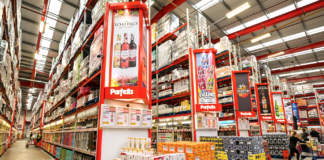Tan Parsons discovers there’s no secret to Dhamecha’s success.
In all honesty, we are no different from the other cash & carries,” says Dhamecha trading director Mukesh Vithlani. This self-effacement masks the group’s formidable presence as a wholesale powerhouse in the capital and the biggest member of the Today’s Group.
What Vithlani really means is that there is no secret formula behind Dhamecha’s success – this has come from consistently offering its customers brilliant service, product availability and price. Exceeding customer expectations is crucial.
“We create loyalty by making sure customers feel good when they come in and go out with better prices than they expected – deals that exceed their expectations,” says Vithlani.
Dhamecha runs weekly offers – themed promotions that don’t get mailed out. So theatre is important. The team creates displays of all the weekly promotions in the front of the depot.
“I’ve got half a dozen customers who come in especially to buy these,” Vithlani says. “They’ll say, ‘These two trolleys were not on my list but because it’s out there, displayed – with good prices – I’ve now done extra shopping because of that.’ Our customers do plan their visits, but when they come in, this is the icing on the cake. We will give them something they are least expecting.”
Dhamecha’s trade days are huge sales drivers and can double footfall in 24 hours. There is one of these per quarter in each of Dhamecha’s seven depots, one of which it runs in conjunction with the Today’s Group; the rest it runs independently. Vithlani’s team brings together a range of suppliers on the day, and it is an opportunity for them to catch the customer when they come in and offer them a deal in addition to what’s being promoted.
Laying on a good spread of food is crucial to give customers the energy to sustain them through the best part of the day. However, a wholesaler has to be very careful how to advertise trade days because in such a competitive marketplace, there is always a danger competitors may try to undercut your prices. For this reason, Dhamecha’s deals are not posted ahead of time.
The biggest threat facing Dhamecha is the proliferation of multiple convenience stores on the high street. It is vital as a wholesaler to offer retail customers deals to rival or beat the multiples and give them point-of-sale material to support the deals. It is also crucial to speak to them about the deals.
Vithlani says: “What we try to explain to the retailers is they should offer the deals to the customers because it will create loyalty. You can make money selling the products at normal prices after the promotion. So you are making extra margin on that.”
Technology is still perhaps the biggest opportunity for cash & carry groups to improve their businesses against the multiples, and Dhamecha is embracing digital. Earlier this year, the group ran a project with Coca-Cola Enterprises to set up a ‘virtual assistant’ in its depots.
But Vithlani says it is important to make sure your technology is helping you achieve your goals.
“You need to make sure you keep things simple. Sometimes technology can be far-fetched and divorced from reality. People will say that you want to have this or that gadget, but sometimes it goes against you if you are not careful.
“We need to look at how we can embrace technology and work out what is the next thing we can do – what do our retailers want? We try to make sure we work with the suppliers but also work with our retailers in ensuring they understand.”
Coca-Cola’s virtual assistant was a great example of technology attracting the shopper to draw attention to a product. But with any new technology, you have to consider whether your customers have the time to engage with it. Does it make things easier for them or does it slow them down?
“They might be thinking, ‘I’m busy, I’ve got a shopping list to get through,’ because they just want to get on with it,” he says.
An example of Dhamecha’s practical approach to technology is its setting up of an online ordering system to grow its customer base. This strategy is based on feedback from its sales team: certain retailers have told them they do not shop in cash & carries because they are under severe time pressures.
“We’re looking at a system where they can put in their order online, we’ll collect it for them and then they’ll come to the depot and pick it up,” says Vithlani. “That’s an opportunity. It’ll mainly be to target potential new customers.”
What applies to retailers also applies to consumers, and the increasing number of people doing their food shopping online might justifiably be a cause of concern for those in the wholesale industry – the multiples certainly have had their share of difficulties recently as a result of online shopping.
But Vithlani says this is really an opportunity. He believes there is a chance for wholesalers to capitalise on both online and on the supermarkets’ falling market share if they can get it right.
“I think the technology of online shopping is in a way a hidden benefit for our retailers. It will also be an opportunity because the multiples are losing the confidence of the consumer and shopping habits are changing.
“People buy more online now and when they do that, they do once a week online shopping. Then, when they run out of things or they need to go for their top up, where are they going to go? They’re going to go local.
“It’s a case of ‘I’m okay. I don’t need to go to a multiple, I’ll go to my local shop.’”







